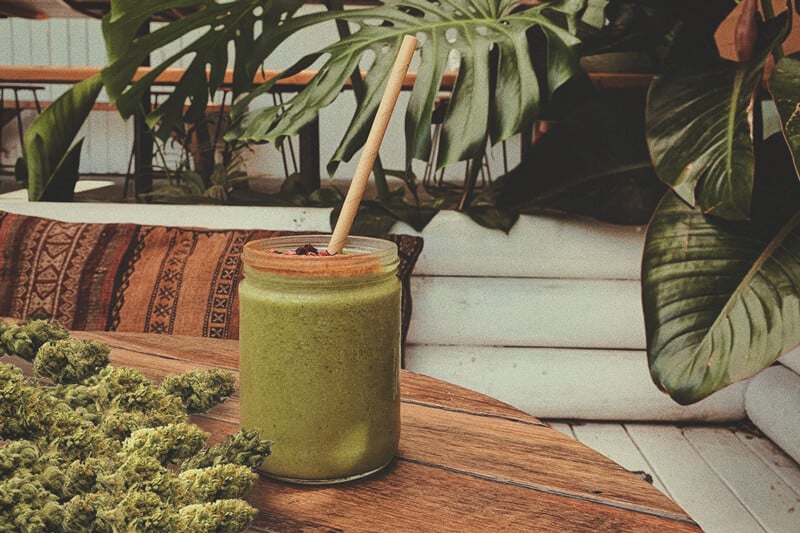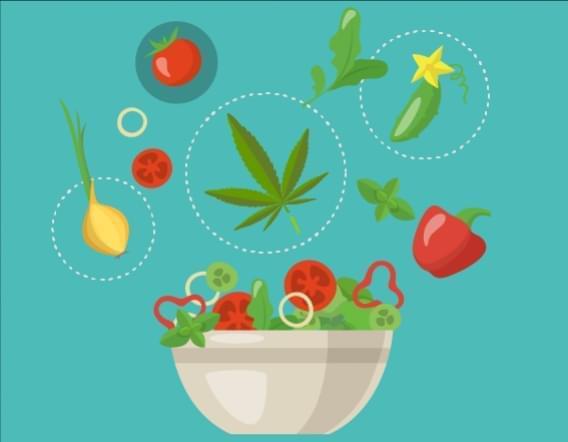.
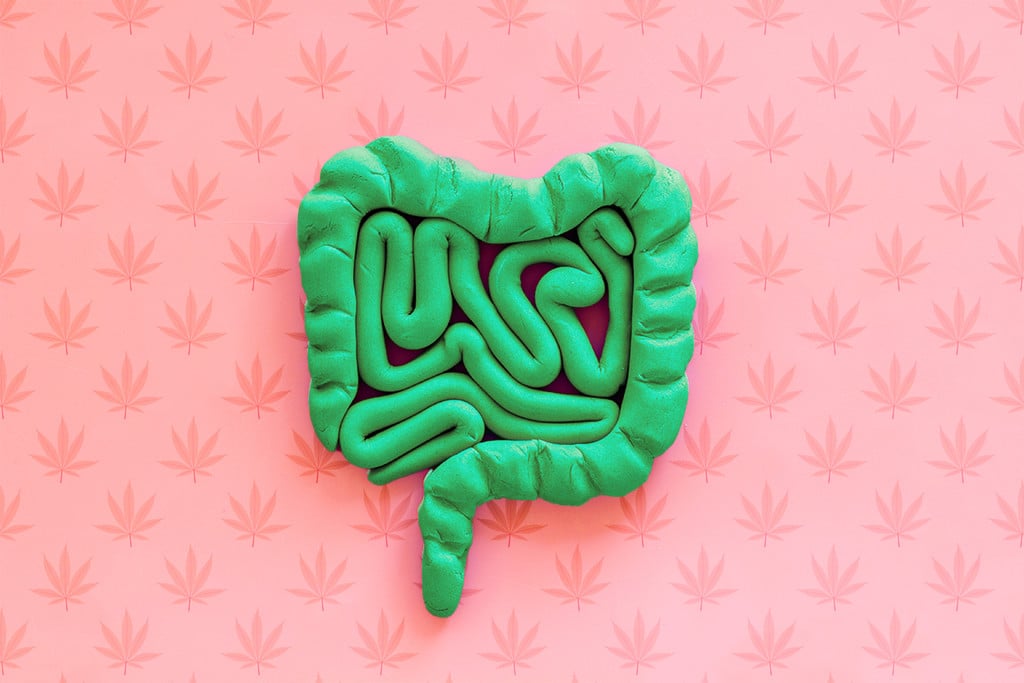
Is There a Link Between Cannabis and Constipation?
One of many therapeutic applications of cannabis is relief from constipation. Stomach pain and bowel problems can often be eased with marijuana. Here's a look at what causes constipation and how cannabis can be of assistance.
Contents:
For thousands of years, many different cultures have used cannabis in an attempt to address issues affecting the gut—one of the first examples being in China in around 2700 BCE. Today, science is moving full steam ahead with research into cannabis' clinical potential. Let's look at the evidence regarding the relationship between cannabis and constipation.
What Is Constipation?
Constipation is when your bowel movements are very hard or happen less often. Affecting people of all ages, for many reasons, it is common and usually not serious. The time between bowel movements varies—for some, it's three times a day; for others, maybe just a few times a week. However, going longer than three days without one is usually too long. After this, your stools get harder and more challenging to pass.
Constipation vs Diarrhoea
If you have been lucky enough to avoid experiencing either condition up until now, here is the difference between constipation and diarrhoea. Both are problems with bowel movements that may cause stomach aches, bloating, and flatulence, but that is where the similarities end. Diarrhoea is when your bowel movements are much more frequent than usual. They will also be loose and watery. Constipation, however, is when your bowel movements are hard and dry, and occur less than three times a week.
It is not unusual to experience short periods of constipation or diarrhoea—these are usually not serious. However, chronic episodes generally show a more significant problem within the digestive system and/or other parts of the body.
Why Constipation Occurs
As food moves through the large intestine, it absorbs water, creating waste products. Muscle contractions then move the waste toward the rectum. By the time it arrives at the rectum, most of the water has been absorbed into the large intestine, leaving a semi-solid stool.
Constipation is what happens when the colon absorbs too much water. . This means that more water is absorbed than it should be. This results in dry, hard bowel movements that take a long time to pass. Constipation can occur for many reasons, including:
- Not drinking enough fluids, especially water
- Not having enough fibre in the diet
- Ignoring the urge to go
- Irritable bowel syndrome (IBS) or other issues with intestinal function
- Laxative abuse
- Changes in habits or lifestyle, such as pregnancy, travel, and old age
- Lifestyle
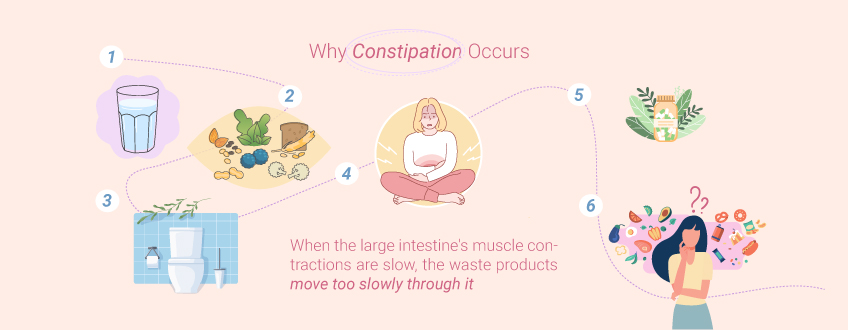
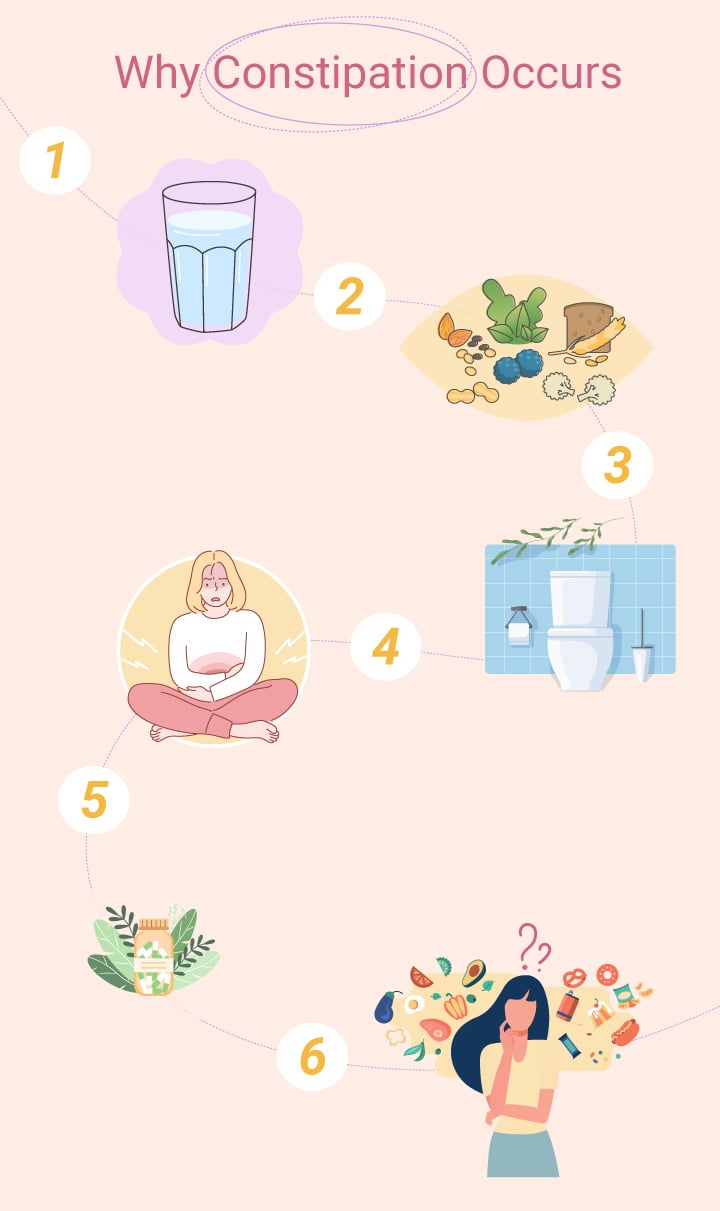
Cannabis and Bowel Function
Cannabis has been subject to fairly widespread use regarding digestive issues, in both clinical and non-clinical contexts. The science is limited; however, studies have so far pitched THC against symptoms of inflammatory bowel disease and the frequency of diarrhoea. There is also research into CBD’s impact on the speed at which waste passes through the intestines.
Furthermore, cannabis is being studied for its potential to indirectly address stomach issues arising from using other types of drugs. Opioids are often prescribed for pain relief and are known to cause constipation. Medical cannabis is currently being trialled for its potential to help reduce opioid use; therefore, it could potentially limit the effects of the latter in causing side effects such as constipation.
Cannabis is also widely appreciated for its ability to put people in a relaxed state. If someone is relaxed, they will find it easier to answer nature's call.
However, there are still reports of a contradictory nature. According to a self-reported study, long-term cannabis users reported increased constipation frequency as their use of cannabis increased.
There are issues with this report, though. Mainly, many individuals who reported constipation as a side effect of cannabis use also suffer from irritable bowel syndrome. Constipation is a common side effect of IBS, meaning these results are not necessarily indicative of cannabis causing constipation.
Ultimately, the majority of evidence to support cannabis in relation to constipation is anecdotal or preliminary. More scientific study is needed. There has, however, been some research into the link between the endocannabinoid system and the gut, which may, in future, help us to answer some more questions definitively.
The Endocannabinoid System (ECS) and the Gut
Many researchers believe the ECS helps the gut and brain communicate. The endocannabinoid system is implicated in gut health in several significant ways[1]. CB1 receptors may be abundant in the central nervous system, but CB2 receptors are more prevalent throughout the gastrointestinal tract. Changes in the brain associated with stress or pain can alter gut function. In addition, changes in the gut induced by inflammation or infection are transmitted back to the brain. This relationship is important for bowel health, and may potentially affect disorders like irritable bowel syndrome.
The ECS plays a critical role in preventing inflammation in the gut. CB1 and CB2 receptors help to calm inflammatory responses when acted upon by particular endocannabinoids. Moreover, it is key to digestion. Contraction of muscles in the gastrointestinal tract allows food to move through the digestive system, and ensures that nutrients are absorbed. When certain cannabinoids bind to CB1 receptors, the resulting action may help to reduce nausea, slow stomach emptying, and reduce the amount of stomach acid. Intense stimulation of the CB1 receptor can even make you hungry—the feeling we know as "the munchies".
Is weed a laxative?
If you look If you look online, you will find many anecdotal claims of recreational weed having a laxative effect, but what does the research suggest? A 2019 study[2] details a 30% decrease in odds of experiencing constipation in those who use cannabis recreationally. It may simply be that when you use cannabis to relax, it physically relaxes your body and muscles, putting you in a much more likely position to go to the toilet.
Moreover, the form in which you ingest cannabis can have an effect. Nicotine is known to have a mild laxative effect, especially if you have a low tolerance. If you are smoking, are you mixing cannabis with nicotine? It is also common to experience loose stools and even diarrhoea after indulging in cannabis-infused food. Remember that, when digested through the stomach, cannabinoids undergo a lot of change and can convert into other chemical forms that may not be gentle on the stomach.
Can CBD Cause Constipation?
There exist very few studies regarding CBD's effect on constipation. However, it is listed as an uncommon side effect of CBD oil, alongside diarrhoea. This could be due to the CBD itself, but it could also be down to the carrier oil and other ingredients included in CBD products.
The Future for Cannabis and Constipation
Findings are limited, but several studies have now linked cannabis, the gut microbiome, and the endocannabinoid system to one another. As we advance, medical science will no doubt explore and unravel this link further to pinpoint new information that may help to alleviate and prevent debilitating digestive conditions such as IBS and Crohn's disease.
Severe constipation issues are more than likely the result of underlying health conditions, and not weed. To address the problem, try stool softeners, make lifestyle and diet changes, and seek professional advice.
Still, we cannot ignore the relationship that appears to exist between our gut and cannabis. If you are experiencing bowel issues and think they may be the result of your cannabis use, try swapping strains, drinking more water, changing your diet, or taking a tolerance break. If you have serious concerns, it is always best to consult your doctor.
- Marijuana and Constipation, a phase IV clinical study of FDA data - eHealthMe https://www.ehealthme.com


























